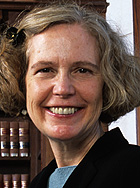Motivated by her own experiences living with a life-threatening illness, Rebecca Dresser, J.D., the Daniel Noyes Kirby Professor at the School of Law and Professor of Ethics at the School of Medicine, has convened a nationally renowned group of bioethicists to study the topic “Bioethics and Cancer: When the Professional Becomes Personal.”

Dresser received a $79,983 grant from the Greenwall Foundation to conduct groundbreaking research and prepare materials based on the unique perspective of bioethicists who all have a personal experience with cancer. Of the seven group members, five have had cancer themselves, and three have cared for spouses with cancer. Dresser was diagnosed with and treated for cancer in 2006.
“In this project, a group of individuals who teach and write about bioethics will examine what can be learned through personal experience with cancer and how this can inform bioethical analysis,” said Dresser, an expert on the legal and ethical dimensions of a variety of medical, biomedical and health-related topics.
“Group members will describe ways of coping with cancer and how we were affected by medical and social responses to the disease. We also will discuss whether our experiences were consistent with the bioethics material we had previously read, taught and written,” she said.
A member of the President’s Council on Bioethics, Dresser noted that cancer is an illness that raises many ethical issues, ranging from medical decision-making to the patient-physician relationship, clinical trials and access to health care.
Due to its pervasiveness, it is also an illness that touches virtually every family in the United States. Cancer is the cause of one of every four deaths in this country. Men in the United States have about a one-in-two chance and women have a one-in-three chance of having cancer.
While bioethics teachers and scholars spend considerable time examining issues related to serious illness such as cancer, few have themselves experienced such illness, Dresser said.
“Though personal experience is not essential to thoughtful analysis, living with a life-threatening illness adds a new dimension to a person’s understanding of many bioethical concerns,” she said.
After examining the personal dimensions of life-threatening illnesses and the professional vantage point they bring to the experience, research group members will develop recommendations for revising clinical practice, ethical analysis and health policy.
“We will seek to capture elements of ‘cancer ethics’ that have not yet been recognized in the clinical or bioethics literature,” Dresser said.
“We will then design publications and presentations to enrich and challenge current thinking about the ethics of cancer patient care, social attitudes toward people with cancer and their caregivers and policies affecting cancer care and research,” she said.
In addition to Dresser, other members of the project group are:
Dan W. Brock, Ph.D., the Frances Glessner Lee Professor of Medical Ethics at Harvard Medical School; Norman Fost, M.D., professor of pediatrics and director of the program in medical ethics at the University of Wisconsin-Madison Medical School; Arthur W. Frank, Ph.D., professor of sociology at the University of Calgary; Leon Kass, M.D., Ph.D., the Addie Clark Harding Professor in the Committee of Social Thought at the University of Chicago; Patricia A. Marshall, Ph.D., professor of bioethics and anthropology at Case Western Reserve University; and John A. Robertson, J.D., the Vinson & Elkins chair at the University of Texas Law School.